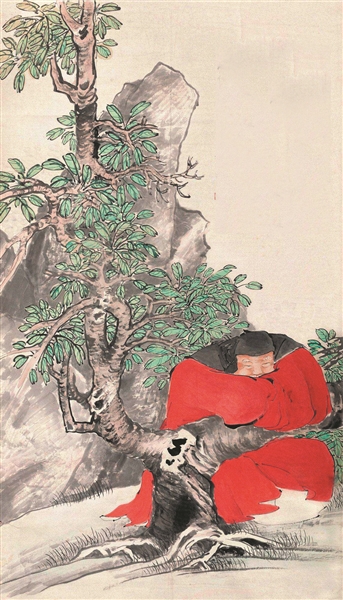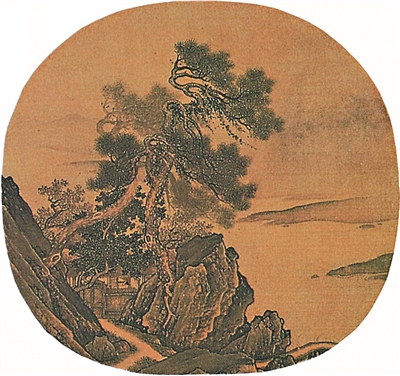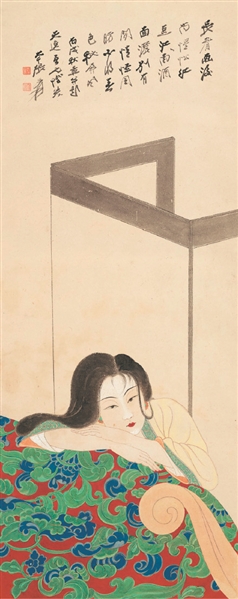Insomnia and lethargy in autumn Huangdi Neijing reminds you to pay attention to gastrointestinal health care.

Wang Zhen and Wang Kun’s "Sleeping Fairy Chen Tuan" in Qing Dynasty

Song Anonymous "Song Feng Gao Lie Tu"

Zhang Daqian’s "The Picture Axis of a Lady Holding a Pant"
In late autumn, the climate is cool, the heat in summer has passed, and the cold in winter has not yet arrived. This kind of climate is beneficial to sleep, but many people sleep abnormally, feel sleepy during the day, and are full of energy at night, counting sheep until dawn.
Traditional Chinese medicine believes that insomnia in autumn is mostly caused by high temperature and heat in summer, which consumes sadness. In autumn, it becomes autumn fatigue, restless, insomnia and dreaminess, and it is difficult to sleep. In addition, since ancient times, every autumn is sad and lonely, and everything in autumn is depressed, people are prone to depression, which leads to insomnia.
Text, photo: Guangzhou Daily all-media reporter Zhong Kui
Insomnia — —
A chronic disease that spans time and space
In fact, abnormal sleep will not only appear in autumn, but also in other seasons. As the saying goes, spring is sleepy in summer and autumn is sleepy. All the year round, people will be in a state of "sleepy", "tired" and "tired", dozing off during the day and unable to sleep at night.
And seasonal changes leading to insomnia is only one of the reasons for insomnia. Any physical discomfort, stress in life and work, mental and psychological changes may lead to insomnia. And insomnia is a chronic disease that spans time and space, which not only puzzles modern people, but also haunts the ancients.
The Book of Songs, the first collection of poems in China, and Guanju, the first book opened, is an insomnia poem;
"My fair lady, ask for it.
The pursuit can not be obtained, the day night will always miss her.
Long miss yo, call people to turn over and over to sleep. "
The young man’s pursuit of a lady was unsuccessful for the time being. He missed it day and night and turned up pancakes in bed at night.
Look at "The Bright Moon Is How Beautiful" in Nineteen Ancient Poems of Han Dynasty;
"How bright the moon is, according to my bed.
Sadness can’t sleep, and I wander around with my clothes on.
Although the guest is happy, it is better to turn back early.
Who should I sue for my worries when I leave home alone?
Leading back into the room, tears stained the dress. "
A wanderer, who was originally happy, was homesick because of a bright moon. He couldn’t sleep at night, got up in clothes and wandered alone.
Look at the first poem of "Yong Huai" by Ruan Ji, one of the "Seven Sages of Bamboo Forest";
"Can’t sleep at night, sit up and play the piano.
The thin curtain looks at the bright moon, and the breeze blows on my chest.
Lonely Hong is in the wild, birds are singing in the north forest.
What will you see when you wander? Worry and sadness alone. "
Ruan Ji, who was insomnia because of worry, simply sat up and played the piano.
……
Poets suffering from insomnia can be said to be everywhere in history, and this is just the tip of the iceberg. There are only a few people who never suffer from insomnia.
Stomach disharmony
You are restless
Because insomnia is a common phenomenon, Huangdi Neijing, the earliest medical classic in China, pays great attention to this problem and spends a lot of time discussing the causes and treatment of insomnia.
Regarding the normal physiological clock of sleep, Huangdi Neijing thinks that the movement of "defending qi" of human body is closely related to the generation of sleep. "The Theory of Soul Pivot and Great Confusion" points out: "The husband who defends qi walks in the yang every day and in the yin at night, so when the yang is exhausted, he lies down, while the yin is exhausted."
The so-called "defending qi" is generated by the essence of the water grain transported by the spleen and stomach. It flows quickly and runs between the skin and muscles, and has the functions of nourishing the skin, opening and closing sweat pores, protecting the muscle surface and preventing the invasion of external evils. The circulation of Wei qi can be divided into yin and yang day and night, and the daytime "walking in the yang" is walking in the three yang meridians of the hands and feet, circulating for 25 weeks. At night, "walking in the yin" means walking in the five internal organs and circulating for 25 weeks. Normally speaking, Wei Qi "walking in Yang" is awake, and "walking in Yin" is sleepy. When Wei Qi has exhausted the five internal organs, people will wake up.
Based on this theory, Huangdi Neijing holds that when the yin and yang of the human body appear excessive and declining or unbalanced, insomnia or sleepiness will occur. "Lingshu Cold and Heat Diseases" said: "Yang qi is full, and yin qi is full." And "yang qi is abundant" means "Wei qi can’t enter the yin, but often stays in the yang", that is, Wei qi still stays in the three yang meridians of the hands and feet at night, so it can’t sleep at night. Similarly, when Wei Qi still stays in the five internal organs during the day and cannot walk on the body surface, it will cause drowsiness.
Huangdi Neijing noted that the "doorway" for Wei Qi to enter the five internal organs from the Yang meridian is the Yangming meridian of the hand and foot, that is, the stomach and the large intestine. If these two meridians are not in harmony, it will prevent Wei Qi from entering the Yin smoothly and lead to insomnia. The "gateway" of Wei Qi from Yin to Yang is the Foot Taiyin Meridian, that is, the spleen. If the spleen is dysfunctional, it will affect Wei Qi from Yang and lead to sleepiness.
It can be seen that the normal function of spleen, stomach and large intestine is the key factor affecting sleep. Therefore, "Su Wen Inverse Tone Theory" says: "Disharmony in the stomach leads to restlessness."
Huangdi Neijing also explains the reason why fat people are prone to sleepiness and thin people are prone to insomnia: "Therefore, the stomach is big … … Then (defending qi) stays in the yin for a long time, and if its qi is not refined, it will be awkward, so it will lie down more. Its intestines and stomach are small, its skin is smooth and slow, its meat is divided and its benefits are relieved, and its defensive qi stays in the yang for a long time, so it is less embarrassing. "
In addition, Huangdi Neijing holds that the quality of sleep is related to people’s spirit. When the spirit is safe, the soul can sleep, and when the spirit is uneasy, there will be sleep disorders such as insomnia, dreaminess, sleepwalking and so on.
How to prevent insomnia and lethargy? Huangdi Neijing pointed out that it is the key to obey the laws of nature in daily work and rest. For example, in autumn, you should "lie down early and get up early, be happy with chickens, make your mind calm, slow down your punishment in autumn, converge your attitude, make your autumn air calm, have no ambition, and make your lungs clear". In addition, attention should be paid to gastrointestinal health care. Such health preservation can effectively prevent Wei Qi from "always staying in the yang" or "always staying in the yin".